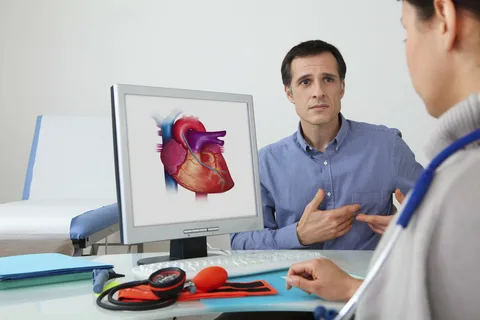Cardiac diagnostics Sydney is one of the best ways to keep your heart healthy. Cardiac diagnostics can be used to check the function of your heart and identify any problems before they become serious health concerns. This article will explain why cardiac diagnostics are important and how to find the best ones for you or your loved ones.
Why You Should Go For Best Cardiac Diagnostics
As the name suggests, cardiac diagnostics are used to detect heart diseases at an early stage. Cardiac diagnostics help to detect the following conditions:
- Heart Failure
- Heart Attacks
- Sudden Cardiac Death
Cardiac Arrhythmias Hypertrophic Cardiomyopathy Diastolic Dysfunction Atrial Fibrillation Myocardial Infarction Coronary Artery Disease Diagnostic cardiac catheterization (DC) is a test that lets your doctor looks inside your heart and blood vessels to find out if there are any problems.
If you have any other questions or concerns, you can always call the hospital and ask for a consultation. You should also be able to find out about their service fees beforehand, so there are no surprises when it’s time to pay.
It’s important to know that cardiac diagnostics is not a substitute for treatment. It can only determine whether you have heart disease and what treatment you need. When should I get a cardiac catheterization? Cardiac catheterization is an important test that can help determine if there are any problems with your heart. You may need a cardiac catheterization if you have symptoms of heart disease, such as chest pain or shortness of breath.
If you have symptoms of heart disease, such as chest pain or shortness of breath, your doctor may recommend that you get a cardiac catheterization. Cardiac catheterization is an important test that can help determine if there are any problems with your heart. You may need a cardiac catheterization if you have symptoms of heart disease, such as chest pain or shortness of breath. If you have symptoms of heart disease, such as chest pain or shortness of breath, your doctor may recommend that you get a cardiac catheterization.
How To Find The Best Cardiac Diagnostics
You can find the best cardiac diagnostics by:
- Checking the credentials of the doctor. Make sure that he or she is a specialist in cardiology and has been trained to perform advanced procedures.
- Checking if they have a good reputation. You can ask if anyone has any recommendations for you or if they have heard anything about the hospital.
- Checking if they offer a free consultation so that you can ask about their services, prices, and availability of appointments on weekends.
There are many types of cardiac diagnostics that help in identifying abnormalities in the heart and blood vessels. These include electrocardiography (ECG), echocardiography, stress tests, and Holter monitoring heart attack, an acute myocardial infarction (AMI) caused by a blockage of blood flow to the heart. The most common cause of AMI is coronary artery disease, which can lead to chest pain, shortness of breath and nausea. Cardiac electrophysiology studies diagnose heart rhythm problems and help determine if ablation can effectively treat them. If you have any other questions or concerns, you can always call the hospital and ask for a consultation. You should also be able to find out about their service fees beforehand, so there are no surprises when it’s time to pay. A resting ECG is a simple test that records your heart’s electrical activity. It can help identify many types of heart problems, including abnormal rhythms and is often performed as part of an annual physical exam for them.
Cardiac catheterization can also be used to diagnose:
- A heart attack (myocardial infarction)
- Heart valve problems, such as stenosis or regurgitation
- Blood clots in the heart or lung
There are many different kinds of ECGs, including resting and exercise tests. An electrophysiologist may sometimes use an ambulatory ECG monitor to record your heart’s electrical activity over 24 hours. This helps them get a better look at the type and severity of any arrhythmias that may be present.
 Treatment for cardiac ablation is usually done on an outpatient basis, so you can go home the same day. If there are any complications, your doctor may recommend that you stay overnight in the hospital for observation. In some cases, cardiac ablation cannot be performed because of other health problems or the severity of your symptoms.
Treatment for cardiac ablation is usually done on an outpatient basis, so you can go home the same day. If there are any complications, your doctor may recommend that you stay overnight in the hospital for observation. In some cases, cardiac ablation cannot be performed because of other health problems or the severity of your symptoms.
Coronary artery disease is the most common form of heart disease and can lead to a heart attack if not treated correctly. Coronary artery disease occurs when plaque builds up on the inside walls of your coronary arteries and narrows them so that blood cannot flow through them properly. When this happens, you-After your procedure, you will be taken to a recovery room or discharged home with instructions for caring for yourself. -Your doctor will schedule follow-up appointments to evaluate how well the procedure worked and to monitor any complications.r
-Your doctor may recommend you take an aspirin-free antiplatelet medication for a short period before and after your ablation procedure. This helps prevent blood clots from forming in the heart and your body.
Cardiac diagnostics are one of the best ways to keep the heart healthy
Cardiac Diagnostics is one of the best ways to keep the heart healthy. Cardiac diagnostic is a non-invasive test that helps in detecting heart disease. A doctor does cardiac diagnostics after listening to your symptoms and performing a physical examination. It identifies heart muscle and blood vessel abnormalities, which helps treat cardiac problems. It can also predict when you’ll need treatment for conditions like high blood pressure or diabetes. This test uses a long, flexible tube called a catheter. The catheter is inserted through a vein in your leg or arm into the heart, providing images of your heart and blood vessels on an ultrasound screen. This can help your doctor see if there are any blockages or leaks in your heart valves.
Some of the most common cardiac diagnostic tests include Electrocardiography (ECG). A resting ECG is a simple test that records your heart’s electrical activity. It can help identify many heart problems, including abnormal rhythms and is often performed as part of an annual physical exam. Coronary artery disease is the most common form of heart disease and can lead to a heart attack if not treated correctly. Coronary artery disease occurs when plaque builds up on the inside walls of your coronary arteries and narrows them so that blood cannot flow through them properly. When this happens, your heart does not receive enough oxygen-rich blood and can’t pump effectively.
A resting ECG is a simple test that records your heart’s electrical activity. It can help identify many heart problems, including abnormal rhythms and is often performed as part of an annual physical exam.
Coronary artery disease is the most common form of heart disease and can lead to a heart attack if not treated correctly. Coronary artery disease occurs when plaque builds up on the inside walls of your coronary arteries and narrows them so that blood cannot flow through them properly. When this happens, your heart does not receive enough oxygen-rich blood and can’t pump effectively.
Conclusion
Cardiac diagnostic exams are one of the most important tests that you can regularly have. This can help you maintain your heart health and prevent any problems that may arise in the future. If you do not have any symptoms of heart disease, getting tested is especially important so that you don’t ever have to worry about it coming up on its own without warning! Are you searching for the best cardiologists in Sydney? If yes, don’t fret. Advanced Cardiology has covered you at an affordable price.
Related Website
Articles on allcityforums
Articles on Blogseu
Articles on skankblogs
Articles on moblogs
Articles on keyforums
